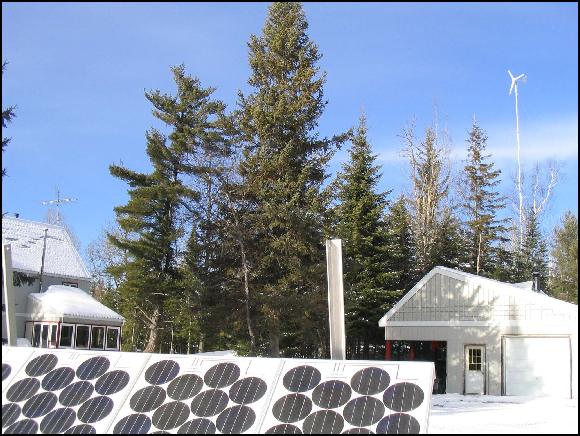|
I'll offer just three reasons, which are admittedly personal.
- I've
been using renewable energy in the form of wood heating for over 40
years and the subject has been a passion and a career for almost as
long. Every aspect of the technology, as well as its social and
political implications, have fascinated me and kept me engaged from the
beginning. Once deeply engaged in one renewable energy, all
renewable energy sources became collateral interests, so I have thought
about and casually researched solar and wind power all along.
Then a few years ago Wendy's career took a slow turn from social work
to energy through a rather circuitous route. In 2003 she earned a
doctorate at the University of Guelph, in the rural studies program
looking at sustainable rural community. While her academic work
was far too complicated to describe properly here, it dealt generally
with issues of energy literacy, the extent to which citizens are able
to make informed decisions regarding energy, decisions that serve their
household, community, security and environmental objectives. So
the first reason is that Wendy and I are interested in and reasonably
well informed about energy issues and renewable energy in
particular. In full academic flight, she would describe this as a
participatory energy research project.
- Secondly,
as one who is steeped in the small scale, through my interests in
household wood energy, I have a general antipathy towards large scale
systems of all kinds, and electrical utilities, Ontario's in
particular, are conspicuous examples of what I consider devious,
exploitive, and, at their root, anti-democratic institutions. My
payment each month to what used to be called Ontario Hydro, but has now
been privatized into something that will probably be worse, especially
for rural people, seems to me a perverse kind of endorsement of their
corporate and industrial shenanigans. I want take a stand, to put
my money where my mouth is, to vote with my wallet, as they say.
- And finally, based on my reading
over the past several years, I have concluded that we are on the brink
of a worldwide transformation in the meaning of energy. Since the
beginning of the modern age, industrially developed nations have
experienced rapid economic growth and have accumulated spectacular
wealth. The beneficiaries of this phenomenon, supported by the
voodoo of classical economic theory, believe their good fortune was the
result of rigorously applied capitalism and the cleverness of its
practitioners. I now think this growth was fueled and lubricated
by cheap energy, oil specifically. And now that the cheap oil is
almost gone, its price, and that of all other energy "commodities" will
rise to dizzying heights, never to fall again. Growth will stop
and economies will begin a long term contraction, which is rather like
death in classical economic terms. Sound alarmist? Maybe, but I'm
in good company. So, our household and office renewable energy system
is part of our investments for future security, much like other people
buy mutual funds.
Those
are three reasons for our efforts to move towards energy independence:
interest and curiosity, political and moral grounds, and finally,
concern about the future.
|
